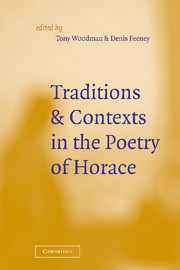Book contents
- Frontmatter
- Contents
- List of contributors
- Prologue
- Acknowledgements
- 1 HORACE'S BIRTHDAY AND DEATHDAY
- 2 AMICVS CERTVS IN RE INCERTA CERNITVR: Epode I
- 3 DREAMING ABOUT QUIRINUS: Horace's Satires and the development of Augustan poetry
- 4 BIFORMIS VATES: the Odes, Catullus and Greek lyric
- 5 THE ODES: just where do you draw the line?
- 6 A WINE-JAR FOR MESSALLA: Carmina 3.21
- 7 FEMININE ENDINGS, LYRIC SEDUCTIONS
- 8 THE UNIQUENESS OF THE CARMEN SAECVLARE AND ITS TRADITION
- 9 SOLVS SAPIENS LIBER EST: recommissioning lyric in Epistles 1
- 10 POETRY, PHILOSOPHY, POLITICS AND PLAY: Epistles 1
- 11 HORACE, CICERO AND AUGUSTUS, OR THE POET STATESMAN AT EPISTLES 2.1.256
- 12 VNA CVM SCRIPTORE MEO: poetry, Principate and the traditions of literary history in the Epistle to Augustus
- 13 EPILOGUE
- Notes
- Abbreviations and bibliography
- Indexes
11 - HORACE, CICERO AND AUGUSTUS, OR THE POET STATESMAN AT EPISTLES 2.1.256
Published online by Cambridge University Press: 22 September 2009
- Frontmatter
- Contents
- List of contributors
- Prologue
- Acknowledgements
- 1 HORACE'S BIRTHDAY AND DEATHDAY
- 2 AMICVS CERTVS IN RE INCERTA CERNITVR: Epode I
- 3 DREAMING ABOUT QUIRINUS: Horace's Satires and the development of Augustan poetry
- 4 BIFORMIS VATES: the Odes, Catullus and Greek lyric
- 5 THE ODES: just where do you draw the line?
- 6 A WINE-JAR FOR MESSALLA: Carmina 3.21
- 7 FEMININE ENDINGS, LYRIC SEDUCTIONS
- 8 THE UNIQUENESS OF THE CARMEN SAECVLARE AND ITS TRADITION
- 9 SOLVS SAPIENS LIBER EST: recommissioning lyric in Epistles 1
- 10 POETRY, PHILOSOPHY, POLITICS AND PLAY: Epistles 1
- 11 HORACE, CICERO AND AUGUSTUS, OR THE POET STATESMAN AT EPISTLES 2.1.256
- 12 VNA CVM SCRIPTORE MEO: poetry, Principate and the traditions of literary history in the Epistle to Augustus
- 13 EPILOGUE
- Notes
- Abbreviations and bibliography
- Indexes
Summary
Horace and Cicero: poets with a philosophic bent, Republicans who came down on the losing side of civil war in the wake of Caesar's assassination but nevertheless admired the man who became Augustus, authors preoccupied with their own immortality and who thought hard about art's commemorative task. Augustus and Cicero: statesmen with a literary bent, whose prose was more successful than their poetry, who wrote accounts of their own accomplishments, and took especial pride in saving the state from civil disturbance, who were hailed as pater patriae and thought of themselves as new founders, but whose role in bringing peace came with the terrible price of putting Roman citizens to death without trial. My tendentious descriptions emphasise the many similarities linking Horace, Cicero, and Augustus despite all the differences: Cicero's poetry was an afterthought to his political career; the death of the Catilinarians could be defended in legal terms while the triumviral proscriptions could not; Augustus succeeded where Cicero failed.
I will argue that Cicero triangulates the relation of Horace to Augustus in Epist. 2.1. Horace cites Cicero's poetry in declining to write the princeps' res gestae:
o fortunatam natam me consule Romam
(fr. 8)et formidatam Parthis te principe Romam
(Epist. 2.1.256)Horace's line also shares a verbal similarity with Augustus' own Res gestae. Augustus says me principe (13) in talking about the closing of the gates of Janus, mentioned in the previous line of Horace's epistle – the pronoun is Cicero's, the noun Horace's.
- Type
- Chapter
- Information
- Traditions and Contexts in the Poetry of Horace , pp. 158 - 171Publisher: Cambridge University PressPrint publication year: 2002
- 3
- Cited by



